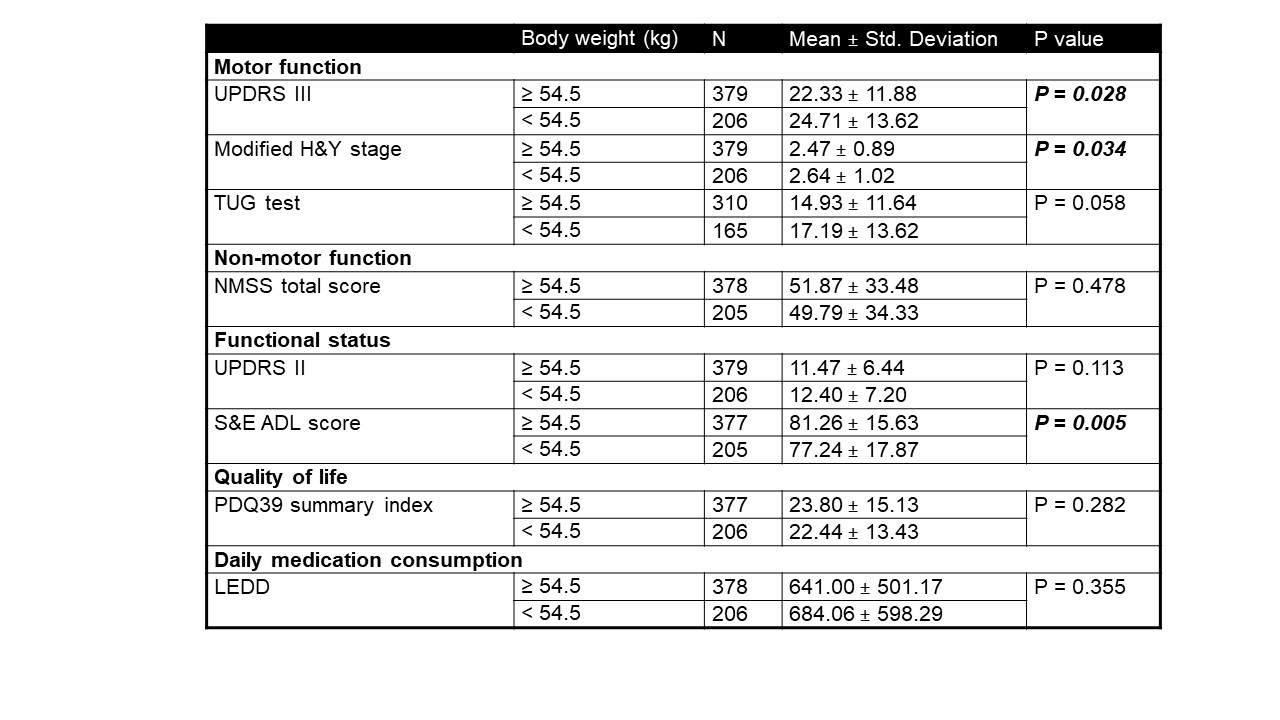Session Information
Date: Monday, October 8, 2018
Session Title: Parkinson's Disease: Pathophysiology
Session Time: 1:15pm-2:45pm
Location: Hall 3FG
Objective: To assess if low body weight and malnutrition is associated with poor functional status in PD.
Background: It has been observed that many advanced PD patients are malnourished. The poor nutritional status may be related to dysphagia, increased energy expenditure and neuropsychiatric problems such as depression and dementia. However, literature studying this area is scarce.
Methods: Study design: An observational study conducted in the multidisciplinary PD clinic of Queen Elizabeth Hospital of Hong Kong between October 2014 and January 2018. Inclusion criteria: 1. A clinical diagnosis of PD based on the UK Brain Bank criteria. 2. Ability to complete the study questionnaires. 3. Written informed consent signed. Method: 1. Cut-off point of body weight: a) A body mass index (BMI) lower than 20 kg/m2 indicated an increased risk of malnutrition. b) An average body height of adults in Hong Kong was found to be 1.65m. c) This came up with a cut-off of body weight of 54.5 kg. 2. The participants were divided into two groups: a) Body weight ≥ 54.5 kg. b) Body weight < 54.5 kg. 3. Motor and non-motor function, functional status, quality of life (QoL) and drug dosage were compared between two groups. 4. SPSS version 20 was used for statistical analysis.
Results: 1. Subjects with lower body weight were found to have poorer motor function and functional status (Table 1). 2. There was no significant difference in the non-motor function, QoL and drug dosage between the two groups (Table 1).
Conclusions: Malnutrition / underweight seems to be associated with poorer motor function and functional status. Further studies using body mass index may be useful to further evaluate the relationship between nutritional status / body weight and disease severity in PD patients.
To cite this abstract in AMA style:
HF. Chan, N. Cheung, D. Chau, CW. Woo, B. Chee, A. Leung, S. Or, WC. Fong. Low body weight is associated with poor functional status in Parkinson’s disease (PD) [abstract]. Mov Disord. 2018; 33 (suppl 2). https://www.mdsabstracts.org/abstract/low-body-weight-is-associated-with-poor-functional-status-in-parkinsons-disease-pd/. Accessed December 19, 2025.« Back to 2018 International Congress
MDS Abstracts - https://www.mdsabstracts.org/abstract/low-body-weight-is-associated-with-poor-functional-status-in-parkinsons-disease-pd/

